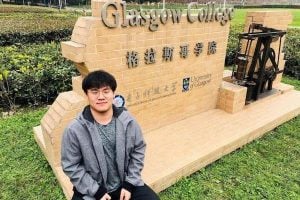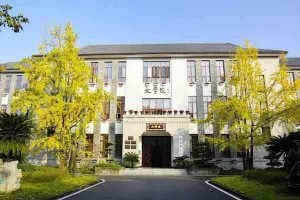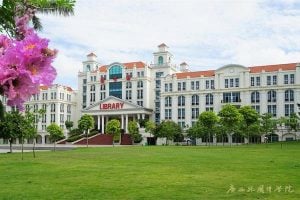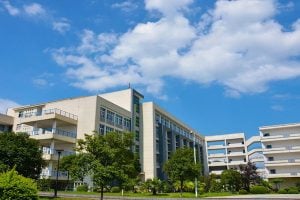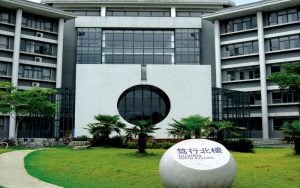Beijing Technology and Business University
 |
 |
 |
 |
Introduction to Beijing Technology and Business University
Beijing Technology and Business University (北京工商大学, website) is a key multi-disciplinary university in Beijing. Approved by the Ministry of Education in June 1999, it was merged by Beijing Institute of Light Industry and Beijing Business School, and merged into the Machinery Industry Management College. Beijing Business School is affiliated to the Ministry of Commerce and the Ministry of Internal Trade, formerly the All-China Supply and Marketing Cooperative Leadership School and the Central Business Cadre School. The All-China Supply and Marketing Cooperative Cadre School was established in the early 1950s, and the Central Business Cadre School was established in 1953. In 1958, the All-China Supply and Marketing Cooperative Cadre School was merged into the Central Business Cadre School. In 1959, the Ministry of Commerce was approved by the State Council to establish the Central Business School, and in 1960 it was renamed the Beijing Business School. The Central Business Cadre School merged with the Beijing Business School. Beijing Business School was suspended due to the “Cultural Revolution” in 1969, and enrollment was resumed with the approval of the State Council in 1978. Beijing Business School is one of the earliest colleges and universities specialized in cultivating economic management talents after the founding of the People’s Republic of China. It is the first batch of national master’s degree granting units approved by the State Council. Beijing Institute of Light Industry, founded in 1958, is the earliest light industry college in China. It moved to Xianyang City, Shaanxi Province in 1970, and was rebuilt at the original site in Beijing in 1978 with the approval of the State Council. It has been affiliated with the Ministry of Light Industry and the China Light Industry Association, and mainly trains senior professionals for the light industry. The Mechanical Industry Management Cadre College was established in 1982 and is affiliated to the Ministry of Machinery Industry. It mainly trains management cadres for the machinery industry. So far, the school has trained more than 100,000 professionals at all levels for the country.
Since 2004, Beijing Technology and Business University and Central University of Finance and Economics have jointly recruited and trained doctoral students in accounting. In June 2007, the school received an evaluation of the undergraduate teaching work level of the general colleges and universities in the country. In March 2008, the Ministry of Education convened a committee of the National Expert Committee for the Evaluation of Undergraduate Teaching in General Institutions of Higher Education. All members voted to determine that the evaluation result of the undergraduate teaching work of Beijing Technology and Business University was “excellent”. In December 2012, school food (including health food) additives and safety became the “Personnel Training Program for Doctors with Special Needs in Serving the Country”, and the degree was awarded as “Food Science and Engineering”. In September 2014, the discipline “Food Science and Engineering” was approved to establish a new post-doctoral scientific research mobile station. In September 2019, the discipline “Applied Economics” was approved to establish a new post-doctoral scientific research mobile station. In May 2018, with the approval of the Thirty-fourth Meeting of the Degree Committee of the State Council, the school became a doctoral degree awarding unit, and applied economics, food science and engineering was approved as a first-level subject doctoral degree authorization point.
Beijing Technology and Business University currently has 14 colleges and 1 teaching department; it has 2 national testing centers, 1 national experimental teaching demonstration center, 2 national virtual simulation experimental teaching centers (projects), and 1 national engineering project. Laboratory, 1 China-Canada Joint Laboratory of the Ministry of Science and Technology, 1 Beijing High-Tech Center, 4 Beijing Key Laboratories, 1 Beijing Laboratory, 1 Beijing Higher Education Engineering Research Center, 1 Beijing City Engineering Technology Research Center, 2 Beijing Research Bases, 1 Beijing Think Tank Base, 1 Provincial and Ministerial Collaborative Innovation Center, 4 Beijing College Experimental Teaching Demonstration Centers; 2 existing doctoral degree authorization centers There are 1 joint training points for doctoral degree, 16 first degree master degree authorized points, 19 master degree authorized degrees (including 7 master’s degree fields of engineering), and 52 undergraduate majors. The school has 5 national specialty specialty construction sites, 8 Beijing specialty specialty construction sites, 1 national undergraduate specialty comprehensive reform pilot, 1 Beijing specialty group construction and reform pilot, and 3 Beijing specialty comprehensive reform pilots. Beijing is one of the first batch of first-class majors in universities. From 2002 to 2012, our university was approved for 4 key disciplines of Beijing in applied chemistry, industrial economics, food science and accounting, applied economics, civil and commercial law, materials processing engineering, computer application technology, environmental engineering, and business management 6 key construction disciplines in Beijing. In 2019, three disciplines of applied economics, food science and engineering, and business management were selected into the list of high-tech disciplines in Beijing universities. The school currently has 15 post-doctoral students (including 9 in joint training), 56 doctoral students, 2634 master’s students, 11,566 full-time undergraduate students in general higher education, and 1096 adult education students.
Beijing Technology and Business University covers a total area of 820,000 square meters (1,230.6 acres), including 210,000 square meters in Fucheng Road campus and 610,000 square meters in Liangxiang campus. The total construction area is 498,100 square meters, of which the Fucheng Road campus is 198,800 square meters and the Liangxiang campus is 300,300 square meters. The total value of fixed assets is 2.918 billion yuan. The total area of the library building is 25793.1 square meters. Up to now, the library has 1.813 million printed documents, 904 Chinese and foreign periodicals, 65 newspapers, 1.898 million e-books, and 107 databases.
Teaching Program
![]() ISAC University Teaching Program
ISAC University Teaching Program
Related Universities


